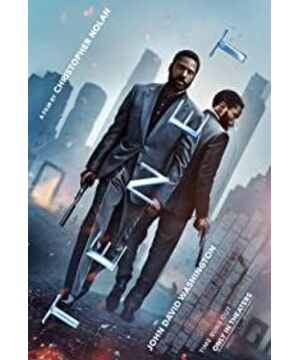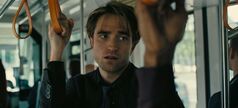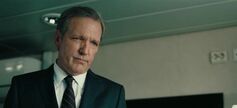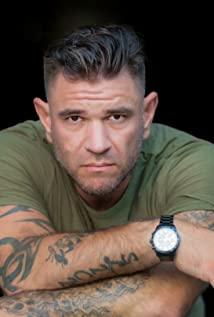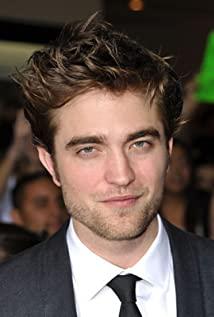Most of Christopher Nolan's films will focus on dialogue, language, and action, or sometimes put his complex thoughts and concepts above the essence of the film—images . In his previous work-"Dunkirk" (Dunkirk), he adopted a "strategy" of reducing dialogue, and successfully used pictures to advance the plot; but this time the new film "Tian Neng" ( TeneT), Lu Lan has returned to the old road, turning the whole movie into a textbook instead of a painting (or a work of art).
In movies that also make a fuss on the timeline, you won’t hear "Triangle", "Looper", "Groundhog Day" and "Twelve Monkeys" In other works, some physical concepts are mentioned "nakedly"; in Korulan's "Tian Neng", even the "grandfather's paradox" is also spoken through the role of the outlet. When the film’s dialogue is merely to lay out or promote the plot service, the film’s lines will become uninteresting; although some of Lu Lan’s past works also have this tendency, this problem in "Tian Neng" appears to be more serious, so After I read it, it’s hard to find a line that can hit my heart. On the contrary, it’s an "eight o’clock stall" like "What I can’t get, and others will not get it." The dialogue I squirted out of the water while drinking water in the theater (this dialogue was still said by Kenneth Branagh, who was born in Shakespeare's drama), was very impressive.
And due to the paleness of the lines, the characters have become paler, and the characters have been reduced to narration machines, wasting good actors like Michael Cain and Dimple Kapadia. Can not show their characteristics or performance charm. Lu Lan's expression of emotions is one of the main barriers preventing him from being promoted to film master. First-class directors are rarely sensational, but "Interstellar" (Interstellar) "incites" too much. But when it comes to "Tian Neng", Lu Lan can't even be sensational. For example, the scene near the end, obviously wants to make the audience sad, but because there are too many similar fateful sections (Lian Taiwan drama "I want to see you" are involved), which makes me feel not deeply. The emotions presented in "Tian Neng" most of the time are as cold as physical concepts. As one netizen said, when the characters are reading the dialogue, they are not as good as the characters in "A Journey to the West: Moonlight Treasure Box" , So emotional (the setting of "Moonlight Treasure Box" is a bit similar to this film).
Warning: The following text has started to have spoilers, so stay tuned
Lu Lan, who likes special agent/spy movies, intends to imitate works such as "007" and "Professional Agent Team" in "Tian Neng". Judging from the action scenes, the theater explosion at the beginning, the mid-section close combat, and the plane crashing into an Oslo duty-free warehouse imitating the Pentagon design (does it remind you of the 9/11 attacks), to the road chase scene in the middle and later sections, and then to the end The battles of the segments are all the routine bridge segments that typical agent/spy blockbuster movies will have (and the timing of these scenes in this movie is also very "routine"). I might as well borrow Roger Ebert's evaluation of "007 Golden Finger": Even if "Tian Neng" is not a great movie, it is still an entertainment movie that can bring us a lot of sensory excitement.
"Tian Neng" has the above-mentioned typical elements, but Lulanga inserted the concept of inverse entropy and showed it in the image, which is still refreshing. In traditional spy movies, the protagonist has to rely on intelligence gathered from various places to destroy the villain’s conspiracy; but even if there is a similar part of "Tian Neng", it puts forward that "ignorance is our most powerful weapon and ammunition". Subversive argument (even we don’t even know the name of the male lead), and it is also a kind of "reverse" to traditional spy movies. In this film, the past cannot be changed, what has happened is what happened, and the protagonists go back to what they did before. In fact, they have also appeared in the past, but everyone was not aware of it at the time. This setting can better reflect the importance of "ignorance"-don't try to change the past to influence the future, and don't be constrained by the known future, but be based on the present and act according to your own feelings. In the middle and later part of the movie, although the protagonists seem to be going back to the past, it can be understood from another angle that "now is happening". While retreating, they are still advancing on the timeline. The result is still unknown. This "ignorance" provides the protagonists with the motivation to continue to take risks, and it also echoes what Lu Lan said to us: You don't try to understand, but to feel and experience.
However, because of this, we cannot ignore the loopholes in the film. Learn from the movie mentioned in the "what happens is what happened." Since the loopholes in "Tian Neng" exist, we can't be regarded as no. Like a world where entropy is reversed, gasoline burning shouldn’t happen; another example is the big villain who has dealt with nuclear weapons when he was young and was exposed to excessive radiation and suffered from cancer. Based on the movie’s settings, since the heroine was wounded by a gunshot, she can also be He is cured in the "retrograde", so when the villain is in the "reverse", his cancer cells should grow from division, spread, and reverse to decrease. He can at least continue to survive, but temporarily does not need to choose to die with the world. And my other feeling about "Tian Neng" is that the whole story itself appears thin. For a spy film or an excellent commercial film, it is very important to tell a good story. Before the Nolan films, will show his ability to tell a story, but in the "days", which is even more ability to Nolan's "degradation", and he continued to play with the narrative technique, and this place is almost The most important position, but it is difficult to completely cover up or modify the mediocrity of the story. Even if we compare the "007" series of films, after watching "Skyfall", we will feel that the later part of the work that took place in the cold Scottish valley is still warm and can arouse everyone's emotional feelings; but "Tian Neng" On the contrary, even if the rear section needs to warm up the emotions, it is like a fire to burn the car, the car windows will still freeze.
As for editing, Lu Lan collaborated with Jennifer Lame, editor of "Manchester by the Sea" and "Marriage Story" for the first time. But for this work that has a large amount of information and can even be made into a TV series/series, she was not able to handle it well-for example, in the paragraph in the Indian arms dealer, some places were edited very abruptly (the male protagonist) One second before he confronted the arms dealer and his wife, the next second he put down his guard and talked with them). And in the later battle scenes, Jennifer Lame’s editing or Lu Lan’s handling were more like chaos, which could not give me a stronger sense of tension and substitution, and also exposed their weaknesses (Lu Lan’s handling of large-scale actions) The scene has never been good). However, in the scene where the heroine returns to the yacht (interspersed with the battle scenes, creating a strong contrast between the two atmospheres), although it seems calm on the surface, it is full of undercurrents. The advantage of Jennifer Lame, who is prominent in Hereditary.
Similarly, Ludwig Göransson, who is responsible for the soundtrack of this film, is also working with Lu Lan for the first time. Ludwig Göransson's work continues the soundtrack style that weakens the melody in Lulan's "Operation Dunkirk", and you can even use the soundtrack as part of the sound effect. When a giant Boeing 747 aircraft "appeared" in the film, the soundtrack sounded at this time not only increased the adrenaline of the audience, but also made the aircraft on the big screen more majestic and majestic. The music turned out to be Can directly affect the visual effect! In the film involving "reverse", in order to reinforce this feature, the soundtrack is unexpectedly played backwards-although they may sound weird at times, they definitely have their own innovations. .
Christopher Lulan in "Heavenly Energy" is a bit like the courageous female protagonist who jumped more than ten meters above sea level at the end, boldly throwing out his thoughts, making the film unbelievable. , Seems to be free ; but Lu Lan is actually a bit like another heroine who is in the "past" time and is constrained by the villain in the same scene at the end. His works are influenced by these ideas and concepts. It is difficult to break free from a certain bondage. And when we watched "Tian Neng" for the first time, because we were in a state of "ignorance", we might admire the creativity of this film (it turns out that "ignorance is the most powerful ammunition"); but as a representative Timely red and blue representing the reverse can exist at the same time. If we watch "Tian Neng" again like the reverse character in the film, we may find a lot of neglected details, but also May be aware that there are more problems with this film.
View more about Tenet reviews


